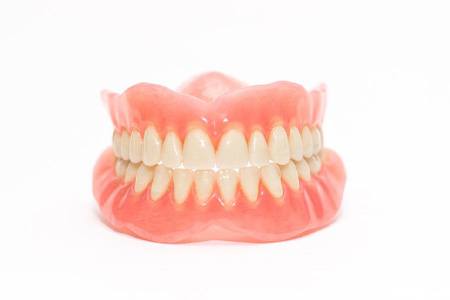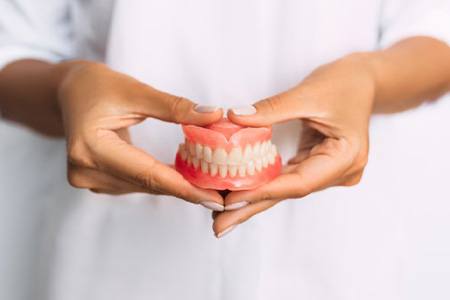
Dentures – Dallas, TX
Fill the Empty Spaces in Your Smile at Once
Missing teeth can affect your physical and mental well-being, which only worsens with every lost tooth. Thanks to dentures in Dallas, though, everyone has the opportunity to regain a functional and confident smile — no matter the tooth gaps! Whether you need full or partial models, we have the tooth replacement options that you need. Therefore, call Arts Family Dentistry today to take the first steps in restoring your smile!

Why Choose Arts Family Dentistry of Dallas for Dentures?
- Personalized prosthetics for any number of missing teeth
- Partnered with local specialists for implant dentures
- An in-house savings plan that makes care more affordable
Who’s a Good Candidate for Dentures?

Those who suffer most from tooth loss effects are the best denture candidates. Such people may have trouble eating, as lacking teeth can make it challenging to chew. They can also struggle to speak, given that pearly whites help pronunciation. Almost always, though, good candidates for dentures will feel embarrassed to smile.
Of course, not everyone with missing teeth may need dentures. For example, someone who doesn’t lack all the teeth along an arch might benefit from a different treatment. On the other hand, a prospect may not have the healthy gums necessary to support dentures properly.
Effects of Missing Teeth

Whether you’ve lost all of your pearly whites or you’re only missing a single tooth, those who have experienced tooth loss are likely to encounter difficulties with a variety of everyday oral habits. On top of feeling self-conscious about your smile, you may find it challenging to eat and chew food properly as well as to speak clearly when conversing with others.
Missing one or several teeth can also have adverse effects on your oral health. Since there won’t be any tooth roots to stimulate your jawbone, your bone tissue can begin to shrink—which can even increase the risk of losing any other remaining teeth. You might also experience complications like malnutrition, indigestion, and a higher chance of periodontal disease.
What Qualifies You for Dentures?

First off, the only way you can be eligible to receive dentures is to ensure that your oral and overall health are in good standing. Should our team detect any underlying or developing problems in your mouth, such as dental decay or periodontal disease, we’ll need to perform the necessary treatments to address them before moving forward with your denture process. This way, we can be sure that your mouth is completely ready to support your prosthetics. Our team will make sure to walk you through the entire process during your initial consultation so that you know exactly what to expect.
Alternative Tooth-Replacement Options

If you aren’t currently eligible for dentures, our staff can work with you to prepare your mouth for your future prosthetics. However, there are alternative ways for us to replace your missing teeth, such as dental bridges and dental implants—both of which are effective solutions in their own right. Here’s what you can expect from either option:
- Dental Bridges : If you’re missing one to four teeth in a row, a dental bridge can easily and efficiently restore your bite. This method involves two dental crowns that are supported by the adjacent natural teeth on either side of the gap so that they can bridge the pontics (artificial teeth) to complete your smile.
- Dental Implants : Instead of sitting on your gum line or fitting atop your abutment teeth, we can rebuild your missing pearly whites by placing titanium posts into your jawbone. These will serve as your new tooth roots, providing an incredibly lifelike and long-lasting foundation for renewing your bite. Best of all: your results can typically last decades to a lifetime with proper care!
Types of Dentures

Prior to an actual denture treatment, you’ll need to consult with Dr. Azimi . That way, you can get an idea of how your results will look. A consultation will also help our team learn your smile goals, medical history, etc.
Based on this initial discussion, we’ll recommend one of three types of dentures. The possible options include:
Partial Dentures
Partial dentures are custom-made for each patient and only replace a few teeth. They work best when filling large gaps between your pearly whites.
A partial denture’s base is made of plastic (resin), cast metal, or porcelain. Regardless of material, however, the prosthetic has a framework and clasps to connect it to your other teeth.
Full Dentures
A full denture, unlike a partial one, restores an entire arch of teeth. As such, it relies on suction to stay secure instead of clasps or frameworks.
Complete dentures have the same materials for their bases as other kinds. That said, they’re adjusted to fit comfortably over your gums.
Implant Dentures
Consider implant dentures if you’d like a more permanent and unwavering option. These models rely on dental implants to stay secure. Consequently, they won’t have some of the downsides of traditional dentures.
Implant dentures also have unique benefits. One, for instance, is that they won’t ever slip or fall from your mouth.
How Dentures are Made

If you’ve decided to commit to dentures from Arts Family Dentistry of Dallas, you’re probably wondering how the process of making them works. Crafting a set of dentures is an intricate process that creates a lifelike appliance that fits comfortably and significantly restores the patient’s chewing power. Here’s a brief overview of how these amazing prosthetic dental appliances are manufactured.
What are Dentures Made Of?

A denture consists of two parts: the base that anchors the appliance in the mouth and the artificial teeth that complete the smile and provide chewing power. Here’s a bit more about how these components are made:
- Base: This foundational structure supports the artificial teeth, and it can be crafted from materials such as acrylic, nylon, porcelain, metal, or resin. Most full dentures are made from acrylic because it can be made to match a patient’s natural gum tissue. The acrylic bases of partial dentures usually include metal clips that allow them to clip on the teeth.
- Artificial teeth: These replacement pearly whites are usually made from resin or porcelain to give them a natural appearance. While porcelain is the most popular option because it is quite durable and looks and feels like natural dental structure, it is not usually used in partial dentures since it can be abrasive on neighboring teeth.
The Denture Creation Process

Each denture is customized to fit the patient’s mouth with a multi-step process that includes:
- Step 1: Azimi will take impressions of your lower and upper gums by having you bite into a tray filled with a special paste. The resulting mold will be used to create a plaster cast of your mouth so your denture can be matched to your gums’ exact measurements.
- Step 2: The cast will be sent to a trusted laboratory where a skilled technician will carefully craft a wax replica of your gumline.
- Step 3: The technician will attach artificial teeth made of acrylic resin to the replica with a machine called an articulator before carving and shaping the wax to ensure it matches your gums.
- Step 4: The wax dentures will be sent back to our office so you can try them on. After you and Dr. Azimi approve the appliance, it will be sent back to the lab for final processing.
- Step 5: At the lab, the technician will place the dentures in a flask to maintain their shape before boiling them to remove the wax portions.
- Step 6: The technician will make holes in the teeth before injecting acrylic mixed with a liquid separator into the flask. These holes allow the teeth to bond with the acrylic as it replaces the wax.
- Step 7: The technician will carefully remove the plaster using special tools to reveal your denture before placing it in an ultrasonic bath to remove any lingering residue.
- Step 8: Any excess acrylic will be removed from the denture before it is polished to perfection.
- Step 9: When the final denture arrives at our office, you’ll come in to try it on. After any final adjustments, you’ll be ready to show the world your new smile.
Adjusting to Your New Dentures

You may experience some discomfort such as mild soreness or the appliance feeling awkward while adjusting to your new dentures, but they will feel increasingly natural as you get more practice eating and speaking with them. You can speed up this acclimation process by eating soft foods at first, stretching your facial muscles, or reading a favorite book out loud and repeating any troublesome words until you can pronounce them easily. Your dentures should eventually feel comfortable and natural, but contact us if your discomfort persists after a few weeks so we can make appropriate adjustments.
The Benefits of Dentures

Dentures are a life-changing tooth replacement option. They can restore the appearance and function of your smile. With dentures in Dallas, you can enjoy a wide variety of perks. Here are some of the most common ones you can look forward to.
Psychological Benefits

Tooth loss can be a difficult thing to accept. Many people who have lost most or all of their teeth encounter negative effects on their self-confidence, resulting in higher levels of sadness and depression. When you restore your smile with dentures, you can improve how you feel about your image, reducing anxieties about your appearance, speech, chewing ability, and more.
Clearer Enunciation

Making certain sounds and saying different words can be a challenge when you have gaps in your smile. To enunciate your words properly, your lips and tongue need to be positioned correctly. When missing teeth, your tongue isn’t about to be positioned properly, making it challenging to say certain words. Since dentures act as your missing teeth, they can help you speak more clearly.
Improves Nutrition

Many nutrient-dense foods are tough in texture, including healthy proteins, fruits, and vegetables. If you can’t chew them thoroughly, your eating habits are negatively affected. Dentures make it easier to bite and chew your favorite foods. Therefore, they let you eat a more nutritious diet that improves your overall health.
Preserves Oral Health

If you still have some healthy natural teeth, dentures can help you keep them that way, By filling in the gaps with a partial denture, you can keep your teeth in place. Dentures also help to bear some of the weight of regular chewing, reducing wear and tear of the natural teeth over time.
Expands Opportunities

When attending interviews, negotiating sales, and attending social events, making an excellent first impression is crucial. Since your smile is one of the very first things people notice about you, having one that appears healthy will do nothing but help in your endeavors. Studies have shown that the probability of being employed is negatively associated with having poor dental health.
Denture FAQs

Can I Sleep with My Dentures?
We recommend that all of our patients take their dentures out each night, leaving them to soak in an antibacterial denture solution while you sleep. It’s easy for dentures to collect bacteria, and for them to flourish under your prosthetic. Taking them out each night gives you an opportunity to keep them clean.
Dentures also naturally restrict circulation in the gums, which can cause issues with the health of your jaw and the soft tissues in your mouth. By taking them out overnight, you give your gums the opportunity to breathe for a while.
Should I Have All My Teeth Pulled to Get Dentures?
If all of your teeth on a single arch are diseased or decayed, it may be a good idea to remove them for your dentures. However, in general, we wouldn’t recommend removing any healthy teeth. Instead, we would recommend either partial dentures or another method of tooth replacement.
If you do need tooth extractions, we’ll talk to you about what that procedure will look like in more detail once we meet you.
Is It Hard to Talk with Dentures?
You might have heard that dentures impair your ability to speak, and when you first get them, this can certainly be the case. The changes to your palate and the number of teeth in your mouth can disrupt how you would normally talk, giving you a little bit of a lisp.
If you find that you’re struggling to speak naturally, don’t worry, you probably just need some practice. Start by speaking slowly and carefully, and over time your lisp will disappear.
If you find that your dentures often move when you speak, you can also try biting down and swallowing before speaking to ensure that your prosthetic is securely in place. You might also consider having your denture relined to ensure that they fit they fit properly.
Will Dentures Change the Shape of My Face?
Losing teeth means that your facial muscles have considerably less support, causing your cheeks to sag. This can give your face a sunken appearance and over time can cause wrinkles. Dentures can make your cheeks look fuller, giving you a more youthful appearance.
It’s also worth noting that poorly-fitting dentures may not be able to support your face as well as they could, so you should be sure to refit or reline your dentures if you notice that they don’t fit well.
I Need a Checkup & Cleaning I Need a Dentist for My Child I am Concerned About Bleeding Gums I Have a Cavity or Broken Tooth I am Missing One or More Teeth I Want to Enhance My Smile I Want a Straighter Smile I am Scared of the Dentist I am in Pain & Need Help I Need My Wisdom Teeth Removed View Our Services



